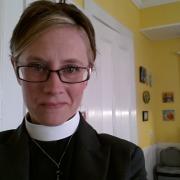When my wife and I became parents, nearly five years ago, we had to talk over many things that most parents will never have to think about. What our children would call us. How we would explain her pregnancy to our family, friends, and even strangers. How we would explain "where babies come from" to our children, when the time came.
In comparison to all of that, figuring out the Hallmark holidays seemed like a no-brainer.
We celebrated our first Mothers' Day when my wife was about 5 months pregnant. Lunch together after church at a local pub - for her, the first of many gigantic Reuben sandwiches that would be her greatest pregnancy craving. The following year, we took our baby son with us to lunch... and left with doggie bags when he never stopped crying. We celebrate Mothers' Day as so many women do throughout this country - except that there are two of us. It is the day that fits us both, that speaks to us both - we who both identify explicitly both as female and as mothers. It seemed such an easy choice.
When we signed our older son up for pre-school, in the community to which we were in the process of moving, we consulted with the owner of the school. Two-mom and two-dad families do this as a matter of course, and the school's owner was very understanding. Her own daughter, it turns out, is also a lesbian mom. My wife and I high-fived on the way out to the car, certain we'd made a perfect choice for our son.
When Mothers' Day rolled around, and he came home with two handprint projects - one for each of us - this impression seemed confirmed.
Then, right before school let out in early June, his teacher walked out with him at pick-up time. The kids had been working on their Fathers' Day projects... and my son had one in his hand. Looking slightly awkward, the teacher said, "I thought he could give it to a grandfather, maybe." Even though the project said, "I love you, Daddy." So much for understanding.
We should be used to reality checks like this. For LGBT parents, even in very progressive areas, they happen on a regular basis: when the rest of the world doesn't remember, or understand, that trying to treat our family as though we're just like any other family can only make us feel more different, more ostracized. The assumption was that not acknowledging our difference would make our son - and us - feel less awkward; the truth was quite the opposite: we felt invisible, shoehorned into a box that doesn't fit us at all.
It may have seemed innocuous to have a four-year-old to make a handprint project, or to sign his name to a poem about fatherhood, even for a father he doesn't have. But it isn't. It's telling the child that his family is abnormal. It's telling him that his family isn't worth recognizing. It's reinforcing the culture that says every child should have a man and a woman in his life; that to have either of those be absent is to be missing something crucial. It's reinforcing a culture that still seeks to impose a gender binary on same-sex couples; to ask us which one is "the man".
And it's not just giving those damaging messages to the children of LGBT parents. The children in my son's class know he has two mothers. It would have made total sense to them that he not participate in the Father's Day project - that he have time to free-draw, or make a card for one of his mothers. After all, he'd made two projects on Mothers' Day. But no; home he came with his handprint... and with a lot of questions.
I am grateful for the presence in my life of my own parents, father and mother, who get grossed out by the glurgy Hallmark cards but who appreciate the times when I am reminded to thank them for being awesome.
But that's the thing: I do have a father and a mother, and I am thankful for their parenting and their ongoing presence in my life. But Fathers' Day and Mothers' Day carry more cultural baggage than that, and it's problematic. There are parents who do not deserve that appreciation. There are families that aren't structured with a father and a mother. There are people who suffer on these days... all the more because the culture tells them to celebrate, whether they're feeling it or not.
The implication is not that two-parent, opposite-sex families are normal and worth celebrating, but that they are the only families that are normal and that they must be celebrated, whatever our individual experiences of them.
Our son is starting kindergarten in the fall, and once again, my wife and I will engage in the LGBT-parent ritual of meeting with the teacher and explaining our family. But Hallmark has forced me to change the conversation, and rethink my own choices. Because next year, he will not come home with two projects on Mothers' Day. He will be celebrating Mommy's Day in May, and Mummy's Day in June. It's an imperfect solution, as questions of gender and binary/normative thinking go. But it is a beginning. It is a way of inhabiting our own
space, as a family, visibly different. It is a reminder that our family is also normal, and worthy of celebration.


The views and opinions expressed in this post are those of the author(s) and do not necessarily reflect those of MomsRising.org.
MomsRising.org strongly encourages our readers to post comments in response to blog posts. We value diversity of opinions and perspectives. Our goals for this space are to be educational, thought-provoking, and respectful. So we actively moderate comments and we reserve the right to edit or remove comments that undermine these goals. Thanks!